See also
| Wikiquote has quotations related to: Democracy and Its Critics |
Democracy and Its Critics is a book in American political science, written by Robert Dahl. The book was published by Yale University Press in 1989. In the following years Democracy and Its Critics won the 1991 Elaine and David Spitz Book Award and the 1990 Woodrow Wilson Foundation Book Award. [1]
In the book, Dahl "examines the most basic assumptions of democratic theory, tests them against the questions raised by its critics, and recasts the theory of democracy into a new and coherent whole. He concludes by discussing the directions in which democracy must move if advanced democratic states are to exist in the future." [2]
| Wikiquote has quotations related to: Democracy and Its Critics |

Democracy is a form of government in which the people have the authority to deliberate and decide legislation, or to choose governing officials to do so. Who is considered part of "the people" and how authority is shared among or delegated by the people has changed over time and at different rates in different countries, but over time more and more of a democratic country's inhabitants have generally been included. Cornerstones of democracy include freedom of assembly, association and speech, inclusiveness and equality, citizenship, consent of the governed, voting rights, freedom from unwarranted governmental deprivation of the right to life and liberty, and minority rights.
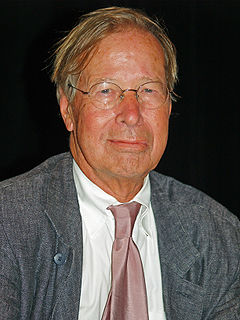
Ronald Myles Dworkin was an American philosopher, jurist, and scholar of United States constitutional law. At the time of his death, he was Frank Henry Sommer Professor of Law and Philosophy at New York University and Professor of Jurisprudence at University College London. Dworkin had taught previously at Yale Law School and the University of Oxford, where he was the Professor of Jurisprudence, successor to renowned philosopher H. L. A. Hart. An influential contributor to both philosophy of law and political philosophy, Dworkin received the 2007 Holberg International Memorial Prize in the Humanities for "his pioneering scholarly work" of "worldwide impact." According to a survey in The Journal of Legal Studies, Dworkin was the second most-cited American legal scholar of the twentieth century. After his death, the Harvard legal scholar Cass Sunstein said Dworkin was "one of the most important legal philosophers of the last 100 years. He may well head the list."
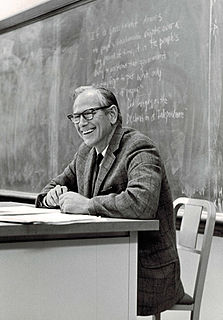
Robert Alan Dahl was an American political theorist and Sterling Professor of Political Science at Yale University.
The David and Elaine Spitz Prize is an award for a book in liberal and/or democratic theory.
How Democratic is the American Constitution? is a book by political scientist Robert A. Dahl that discusses seven "undemocratic" elements of the United States Constitution.
Arend d'Angremond Lijphart is a Dutch-American political scientist specializing in comparative politics, elections and voting systems, democratic institutions, and ethnicity and politics. He is Research Professor Emeritus of Political Science at the University of California, San Diego. He is influential for his work on consociational democracy and his contribution to the new Institutionalism in political science.
In political science, the term polyarchy was used by Robert A. Dahl to describe a form of government in which power is invested in multiple people. It takes the form of neither a dictatorship nor a democracy. This form of government was first implemented in the United States and France and gradually adopted by other countries. According to Dahl, the fundamental democratic principle is "the continuing responsiveness of the government to the preferences of its citizens, considered as political equals" with unimpaired opportunities. A polyarchy is a state that has certain procedures that are necessary conditions for following the democratic principle.

Yale University Press is a university press associated with Yale University. It was founded in 1908 by George Parmly Day, and became an official department of Yale University in 1961, but it remains financially and operationally autonomous.

Barrington Moore Jr. was an American political sociologist, and the son of forester Barrington Moore.
Charles Edward Lindblom was an American academic who studied Economics at the University of Chicago and was Sterling Professor Emeritus of Political Science and Economics at Yale University. He served as President of the American Political Science Association and the Association for Comparative Economic Studies, as well as Director of Yale's Institution for Social and Policy Studies.
Juan José Linz Storch de Gracia was a Spanish sociologist and political scientist specializing in comparative politics. He was Sterling Professor Emeritus of Sociology and Political Science at Yale University and an honorary member of the Scientific Council at the Juan March Institute. He is best known for his work on authoritarian political regimes and democratization.
Anticipatory exclusion refers to a citizen's decision not to attend a discussion due to the anticipation of being excluded. The citizen would never take part in a discussion because he/she believes that his/her views and perspectives wouldn't be given equal time or consideration, when compared to dominant views. In other words, the fear of being excluded, discounted, or dismissed causes a person to decline an opportunity to attend a public event. Calling this "exclusion" implies that the individual's personal decision not to participate actually reflects a larger historical pattern of active exclusion toward similar individuals.
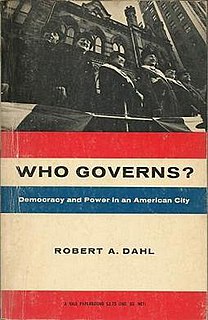
Who Governs?: Democracy and Power in an American City is a book in American political science by Robert Dahl. It was published in 1961 by Yale University Press. Dahl's work is a case study of political power and representation in New Haven, Connecticut. It is widely considered one of the great works of empirical political science of the twentieth century.

Ian Shapiro is a Sterling Professor of Political Science at Yale University. He served as the Henry R. Luce Director of the MacMillan Center at Yale University from 2004 to 2019. He is known primarily for interventions in debates on democracy and on methods of conducting social science research. In democratic theory, he has argued that democracy's value comes primarily from its potential to limit domination rather than, as is conventionally assumed, from its operation as a system of participation, representation, or preference aggregation. In debates about social scientific methods, he is chiefly known for rejecting prevalent theory-driven and method-driven approaches in favor of starting with a problem and then devising suitable methods to study it. His most recent work, coauthored with Michael J. Graetz, Wolf at the Door: The Menace of Economic Insecurity and How to Fight It, proposes achievable policies and strategies to mitigate economic insecurity in the United States.
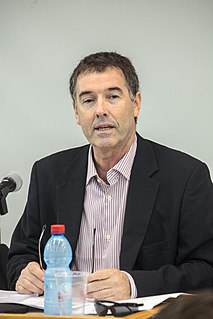
Yossi Shain is currently a member of the Knesset for Yisrael Beiteinu. He is also the Romulo Betancourt Professor of Political Science at Tel Aviv University where he also serves as Head of TAU's School of Political Science, Government and International Affairs, head of the Abba Eban Graduate Studies Program in Diplomacy and Director of the Frances Brody Institute for Applied Diplomacy. He is also a Full Professor of Comparative Government and Diaspora Politics at Georgetown University, and the Founding Director of the Program for Jewish Civilization (PJC) at Georgetown. In 2007, he also served (pro-bono) as President of Western Galilee College. Shain earned his B.A. and M.A. degrees from Tel Aviv University and received his Ph.D. in Political Science from Yale University in 1988. In July 2016 professor Shain was appointed as a member of Council for Higher Education in Israel, and he is now heading the national committee in charge in rejuvenating liberal arts and the humanities.
Cosmopolitan democracy is a political theory which explores the application of norms and values of democracy at the transnational and global sphere. It argues that global governance of the people, by the people, for the people is possible and needed. Writers advocating cosmopolitan democracy include Immanuel Kant, David Held, Daniele Archibugi, Richard Falk, and Mary Kaldor. In the cosmopolitan democracy model, decisions are made by those affected, avoiding a single hierarchical form of authority. According to the nature of the issues at stake, democratic practice should be reinvented to take into account the will of stakeholders. This can be done either through direct participation or through elected representatives. The model advocated by cosmopolitan democrats is confederal and decentralized—global governance without world government—unlike those models of global governance supported by classic World Federalism thinkers, such as Albert Einstein.
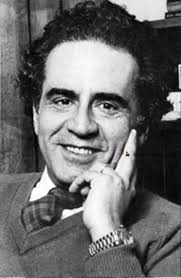
Guillermo Alberto O'Donnell Ure was a prominent Argentine political scientist, specializing in comparative politics, who spent most of his career working in Argentina and the United States, and who made lasting contributions to theorizing on authoritarianism and democratization, democracy and the state, and the politics of Latin America. His brother is Pacho O'Donnell.
Hans T. Blokland is a Dutch social and political theorist.He was a fellow of the Royal Netherlands Academy of the Arts and Sciences and held visiting positions at Yale University and the University ofManchester. Between 2009 and 2015 Blokland was International Professor at the Humboldt University of Berlin. In 2012 he was also appointed on the Corelio-Chair for Media and Democracy at the Free University Brussels. And in 2013 he was appointed on the Alfred Grosser-Chair in sociology of the SciencesPo in France.
Criticism of democracy has been a key part of democracy and its functions. As Josiah Ober explains, "the legitimate role of critics" of democracy may be difficult to define, but one "approach is to divide critics into 'good internal' critics and 'bad external' critics who reject the values embraced and nurtured by constitutional democracy."
Francis William Coker was an American political scientist and the chairman of the Department of Government at Yale University from 1937 to 1945. Coker's work focused on political theory, particularly theories of the state and the nature of democracy.